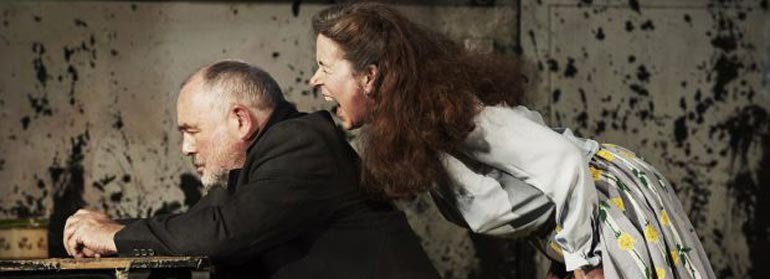In Carmel Winters new play for The Abbey, ‘The Remains of Maisie Duggan’, a lesbian woman comes home to Ireland after a twenty-year absence to confront her family’s demons. It’s a complex unraveling told with a lightness of touch, says Brian Finnegan.
There were nervous titters from the audience in the opening moments of Carmel Winters’ second play for the Abbey, The Remains of Maisie Duggan. A man sits at a table staring silently at a toaster, waiting for it to pop. When it does, he takes two more slices of bread and begins the process again. It’s a device that’s at once comedic and discomforting, as he waits for mundane slices of toast, we wait for the action to begin, not quite knowing what’s going on.
When the action beings, there’s no letting up, except for a strange musical interlude halfway through that like the toaster incident is both funny and sickeningly discombobulating. It’s Winters’ modus operandi in a play that takes the device of a family reunited for funeral and turns it on its head.
Kathleen has returned home from London after a 20-year absence for her mother’s funeral. Yet, her mother seems to be alive and kicking, despite the fact that she herself is convinced she died in a car accident, so much so that she’s posted her own death notice in the Limerick Leader. It’s a confusing premise for everyone, the audience and the characters, and Fly Davis’s set, a dank, crumbling kitchen with an earthen floor that seems to be partly a grave, adds to the blurred line between the living and the dead, what’s real or imagined.
As with all family reunion plays, the prodigal protagonist has returned to confront the dysfunction of her past. Kathleen, who is referred to as ‘it’ or ‘the quare thing’ by her estranged father, is home to make sense of a childhood marked, and a life marred by domestic abuse. That she’s referred to as ‘quare’ by her father may be a reference to her sexuality, she’s not ‘out’ to her family, but Kathleen has a girlfriend back in London.
Kathleen’s brother Tadhg is the one who stayed behind. He’s his father’s lackey, but gets precious little reward for it. It’s intimated that he’s a child of rape, as Maisie tells Kathleen “your father forced me to have him, but he couldn’t force me to love him.”
Maisie plays out her game in which she’s alive and powerless, yet powerful in her death, and the family’s skeletons aren’t so much unearthed as pored over, and then avenged. In between we get moments of farce (particularly a scene where the siblings try to resuscitate a smothered kitten) and broad comedy, but for the most part this play is a fast train on a track that can only lead in one direction.
Winters is exploring the complex consequences of domestic abuse for everyone in the family, particularly the children, who always are forced to choose sides while the lines between the perpetrator and victim are confusingly blurred.
Kathleen, who as a young teenager was given the role of her mother’s protector, has internalised her experience of violence against women and brought it into her own life; Tadgh, jealous of the attention his sister received, will do anything to get the love and attention of his father. Both siblings are stuck in their childhood, while both parents are stuck in the push and pull of violence, recrimination and regret. Maisie’s fake death is the solvent that will unglue them all.
It’s not a play for the lighthearted, yet Winters manages to explore the depths of the Duggan’s dysfunction with a lightness of touch for the most part. The cast members are sound and fully immersed in contradictions their characters, while Cillian Ó Gairbhí’s Tadhg provides a pair of clowning shoulders on which the darkness can sometimes rest. With most of the now failing father’s violence happening as back story rather than in front of our eyes, there’s a slight disconnect in that it’s hard to imagine the power he once wielded, especially as the ‘dead’ Maisie blithely dismisses it for the most part. Still, that violence erupts at the end, leaving this review shell-shocked.
There’s is no such thing as redemption pure and simple by curtain fall, but The Remains of Maisie Duggan is about interrogating parental responsibility in inhumane conditions, and there are no easy answers to that.
The Remains of Maisie Duggan runs at the Peacock Stage at the Abbey theatre until October 29 as part of the Dublin Theatre Festival (Sept 29 to Oct 16), booking here.
© 2016 GCN (Gay Community News). All rights reserved.

comments. Please sign in to comment.